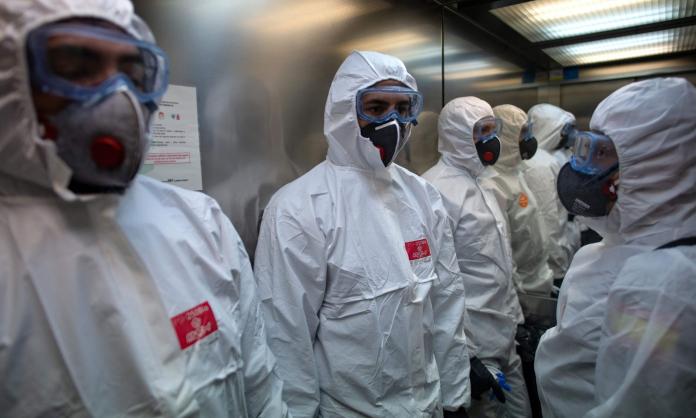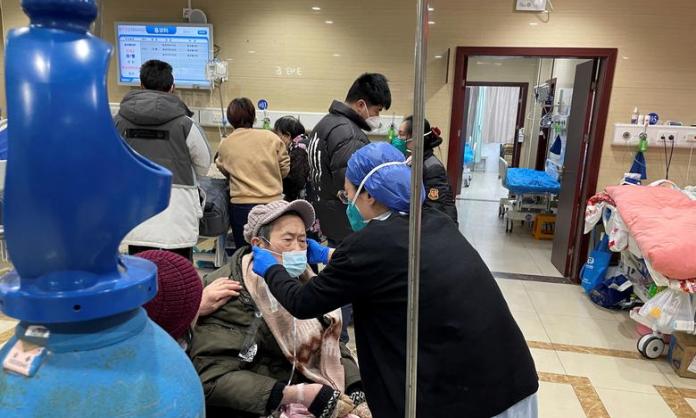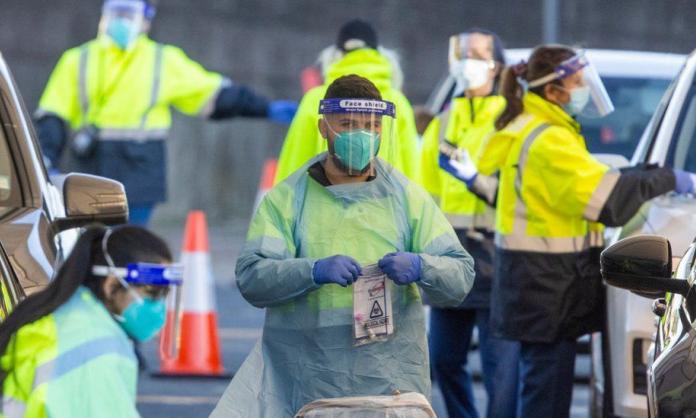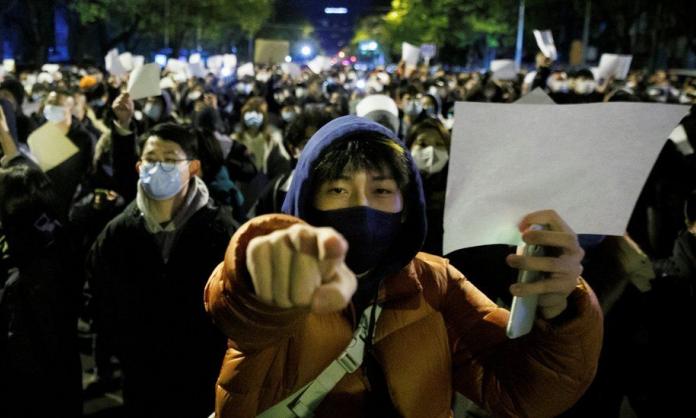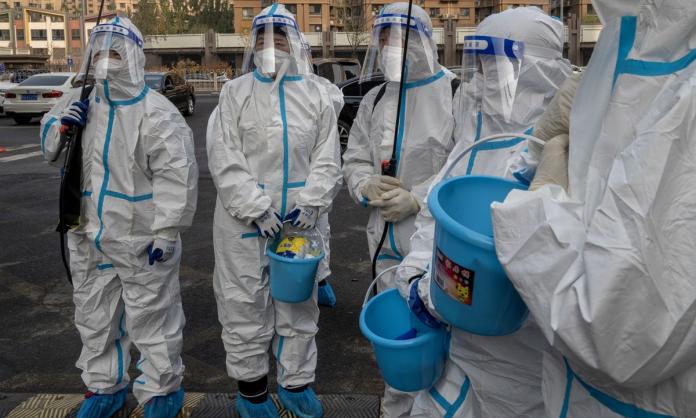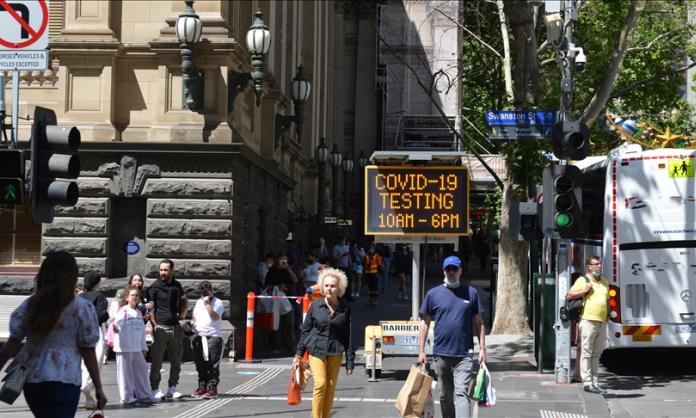The COVID-19 pandemic is running out of control and wreaking havoc all around the world. It is clear now that we are facing not just thousands of deaths, but hundreds of thousands or more.
Elderly people are being found dead in their homes, unable to reach medical care. Young people are turning up to hospital with symptoms but being turned away without being tested and dying at home the following day. Corpses are piled up in refrigerated trucks. The impact of the virus is multiplied by the glaring inadequacies of public health systems, which are being overwhelmed by the flood of new cases.
If the situation is bad in Britain and Europe, with their health systems substantially based on public provision, it looks much worse in the US where the profit motive and the interests of private health insurers dominate. Anthony Fauci, director of the National Institute of Allergy and Infectious Diseases and a member of the White House Coronavirus Task Force, predicts that the death toll in the US alone could reach 200,000.
In the poorer countries, the situation could end up dramatically worse even than the disaster in the West. Epidemiologists simply have no idea how widespread the virus is in such regions. For example, sub-Saharan Africa, home to 1 billion people, has recorded just 4,000 cases and 127 dead. India, with a population of 1.3 billion, just 1,000 cases and 27 dead. Indonesia, population 260 million, 1,300 cases and just 114 dead. It is inconceivable that there are not many more cases undiscovered. And it is also impossible to believe that the situation will not get worse.
In sub-Saharan Africa there were initially only two labs in the entire region capable of performing the necessary testing for the virus. Across the African continent, health services have been hollowed out by decades of International Monetary Fund structural adjustment programs.
Without a vaccine, the two most important public health recommendations to minimise the spread of COVID-19 are straightforward – handwashing and social isolation. But how can social isolation work for tens of millions of poor people in India or Kenya, crammed together in some of the world’s biggest slums? In South Africa, where in poor townships or informal settlements, hundreds of people have only three standpipes between them, how are they meant to wash their hands? In Palestine’s Gaza Strip, where nearly 2 million people are pressed together in the world’s biggest open-air prison, hospital staff are struggling against the effects of years of Israeli blockade.
And here in Australia, in our own “Third World”, self-isolation is impossible for Aboriginal people living 20 to a house in Alice Springs. In such circumstances, frail elderly Aboriginal people on dialysis machines are especially vulnerable with no secure areas in their homes where they may administer their treatment or recuperate. Already health-compromised Indigenous communities on the outstations of Central Australia, now in lockdown, suffer from inadequate government services and lack of cheap, good quality fresh food. An outbreak of COVID-19 could simply tear through these vulnerable communities.
Australia’s prisons and detention centres are another COVID-19 disaster waiting to happen, thousands of people held under guard and sharing communal facilities.
The other side of the disaster is the economic crisis that the virus has triggered. All the big economies are in freefall. Investment bank Morgan Stanley predicts that the US economy will shrink by 30 percent between April and June. The situation is similar in Europe. Unemployment is skyrocketing in the US, more than 3 million people registering as unemployed in the fourth week of March. Those who will lose their jobs include some of the most hard-pressed workers with little in the way of savings or government support to help them survive.
All told, this is set to become one of the greatest crises in the history of capitalism, the Great Depression on steroids.
The initial response by authorities, whose job it is to protect the community and safeguard public health (or so they tell us), has been to downplay the crisis for fear that any measures to limit the spread of the virus would hamper the production and circulation of capital. The Chinese government, now boasting of its success in taming the pandemic, denied the extent of the problem for weeks and persecuted medical whistle blowers. In the US, Trump initially scoffed at suggestions it was a threat – it was “a Democratic hoax”, it would all be over very quickly. The slowness of the response has meant a much more severe toll is inevitable than if prompt action had been taken at the outset.
Complacency has usually been followed by the imposition of serious public health measures as it became clear that the viability of future profit-making was being called into question by the pandemic. Trump’s mocking of concern gave way in mid-March to the declaration of a national emergency. In Britain, prime minister Boris Johnson dragged his feet for weeks, then told the population to expect millions to contract the virus as part of his plan for “herd immunity”, code for mass deaths, and only after a massive public backlash shifted overnight to dramatic measures, including a far-reaching lockdown.
The common theme of all the responses has been that the interests of business are prioritised over those of public health and public welfare. Just look at the stimulus packages. Usually they include some provisions for workers, but those going to businesses are much more generous. The US Congress approved measures worth $2 trillion, but only $500 billion is going on measures to directly help workers.
The short-term fillips to working class livelihoods are for the most part framed as a way of keeping businesses afloat by boosting spending power, rather than looking after the longer-term interests of the working class – a six month limit to increased welfare benefits, for example, rather than an indefinite hike.
The capitalists are continually trying to find ways to weaken the public health measures. In country after country, we have the absurd situation in which whole populations are supposedly in lock down, with social gatherings banned, yet workers are expected to catch public transport and go to work where they will be required to work side by side with hundreds, even thousands, of others.

When governments draw up restricted lists of essential industries allowed to continue operating during shutdowns, the bosses are always immediately on the phone to government ministers demanding that their industry too be added to the list. This is why Trump, having just imposed a series of restrictions on public life, within days was talking about lifting them, suggesting that life would start to come back to normal by Easter. Nothing must get in the way of the almighty dollar.
Governments are eager to talk about measures costing trillions to restore “economic stability” but rarely to make concrete announcements about boosting the health system. China was able to build two field hospitals in just 10 days, but Western leaders have lagged far behind. The resources are always there for new jet fighters and submarines, but medical staff must wait in line and beg for ventilators during a public health crisis.
The necessary public health measures have been accompanied in many cases by limits to our basic civil liberties including, in Australia, suspension of parliaments for five months and rule by decree.
Capitalists are taking advantage of the situation not just to lobby for massive government assistance but also to strip away the wages and conditions of workers. They want to make sure that they are not the ones who will bear the burden of this crisis. So there are layoffs, wage cuts, workers sent into unsafe workplaces to economise on safety provisions.
The bosses want to establish a new expectation for when the worst of the crisis passes, just as occurred with the 2008-09 financial crisis in Europe, where it took a decade for workers to recover lost wages. The public debt piled up by governments aiding big business was then used to justify continued austerity for the working class. We can expect the same this time around.
The crisis is proof that we need to turn the whole system upside down. We need to get rid of the capitalist system. We need socialism instead – a society based on human need, not corporate profits, in which public health is put above “the economy”.
But socialism is not going to fall from the sky. Nor is it going to come about through government action. It’s going to take a fight against capitalists and their governments. We need to build solidarity and unity in the ranks of the working class and the oppressed. We need to mobilise the spirit of the labour movement: “an injury to one is an injury to all”. We need to stand up for the worst off. We cannot leave anyone behind. Workers and the oppressed need to defend themselves
This is not at all the same thing as the kind of “national unity” that governments like to promote. It’s not about Boris Johnson’s “Spirit of the Blitz”. It’s not about unity of everyone from the billionaire to the homeless beggar.
We are not “all in this together”, as should be obvious from the actions of senior management at Qantas who took $715 million from the government and immediately laid off 20,000 staff, two-thirds of the entire workforce. We do not stand with Gerry Harvey who gloated that the panic buying induced by the virus was a tremendous business opportunity. “Our sales are up by 9 percent on last year”, the Harvey Norman boss said with glee. “Our sales in freezers are up 300 per cent. And what about air purifiers? Up 100 per cent!” Making money out of other people’s misery.
Our solidarity is not with the millionaires who have returned from their trips to Aspen or other far-flung luxury resorts only to spread the virus far and wide by refusing to self-isolate. Most of us do not enjoy the privileges afforded the likes of Prince Charles, Boris Johnson and Peter Dutton, who know that they will be tested promptly and enjoy the best medical care possible when they report symptoms of the virus.
Nor can we escape the virus by flying off to some deserted part of the world. We don’t inhabit the same world as US record producer David Geffen, net worth US$7.7 billion, who posted on Instagram a photo of his US$590 million cruise ship at anchor in the West Indies with the comment: “Sunset last night ... Isolated in the Grenadines avoiding the virus. I hope everybody is staying safe”.
We would like to have a say over how the current crisis is handled, but with the politicians suspending parliament for five months, we have even less sway over the political process. That is, unless we are mining executives or CEOs who have been appointed to the Morrison government’s new National COVID-19 Coordination Commission.
We face a global crisis in a world where the richest one percent of humanity control more than half of the world’s wealth, while the bottom 80 percent make do with less than 5 percent.
If the rich won’t do the right thing, it’s up to workers to act. Just as the crisis bites, we find workers fighting for their rights. In Italy, action by workers forced one of the big union federations to call a general strike on 25 March. In France, workers at an Amazon warehouse called a sick-out to pressure their bosses to provide protective equipment, as did shipyard workers on the Atlantic coast.
In the north of Ireland, food processing workers struck for more health safeguards. In the United States, there has been action by workers in the automotive industry, by meatworkers, Amazon workers in New York, postal workers, sanitation workers and even employees of a big defence contractor.
Resistance to lack of health provisions has broken out even in the most desperate circumstances: in prisons in Brazil and Colombia and in three immigrant detention centres in the US, where migrants have gone on hunger strike for better sanitation.
But the other side of resistance is attempts by the privileged minority to defend their power by scapegoating to prevent us from uniting against them.
That’s why Trump makes a point of talking about “the Chinese virus”. The identification of the virus with China has already resulted in a surge of attacks on and abuse towards Chinese people in Britain, the US and Australia. And Trump’s language helps to reinforce the Cold War environment being cultivated by the political establishment to ready the population for a military clash with America’s new imperialist competitor. When we say, “an injury to one is an injury to all”, that includes refugees and migrants. Solidarity means standing against these attempts to sow divisions in our ranks.
We are now, literally, in a fight for our lives. The system has failed. There can be no going back to how things were, no return to “normal” because it is “normal” that has brought us this crisis – the normality of a world in which basic needs, even the right to live, are subjected to the cold calculations of the capitalist class. We have seen the results of their work: environmental crisis and the threat of mass extinction, hundreds of thousands, perhaps millions killed off by a virus and tens of millions thrown out of work and another generation of workers laid to waste.
Those responsible for this must pay for their crimes. Their wealth and power must be taken off them and a new world that prioritises public need, public health and a decent life for this and future generations put in place. The time to fight for this is now.




